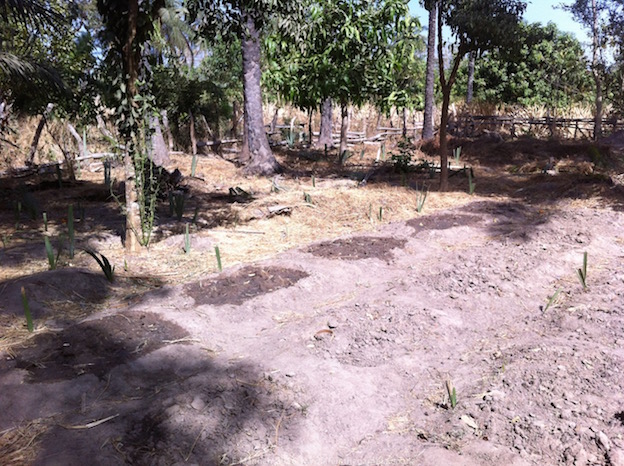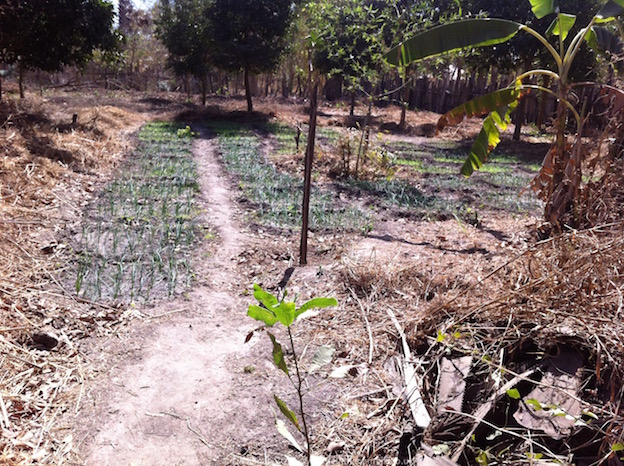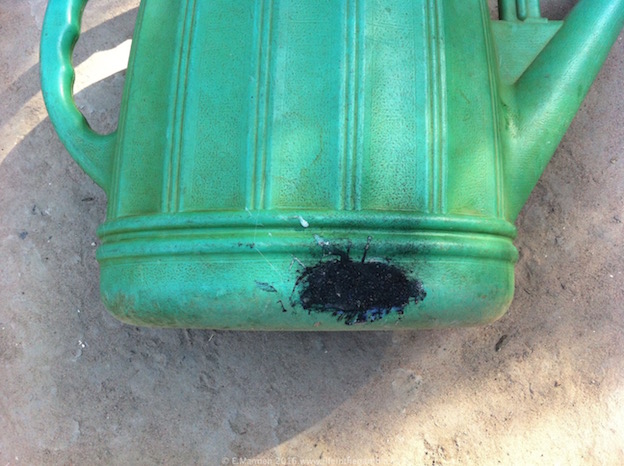Here at Balaba Nature Camp we have quite a large area of land. Of course, much of that is given over to the huts and other buildings we need for when we have guests. But surrounding the central compound we have quite a lot of forest (which is a haven for wildlife), and also a large garden area. If you’ve been reading this blog for a while, you’ll know that we cultivate some and then let the local women use areas so they can grow their own vegetables. In return, they help to water our fruit trees. So I thought it was time to give you an update on the garden so far this year.
By the time I arrived, Saffie was already well ahead with planting onions. She’d managed to grow a huge number of plants from seed, which I’m told is a bit tricky, and she was busy selling seedlings and also transplanting some for herself. We will use some of them ourselves, but she’s also hoping to have enough to sell some mature onions in time.
Traditionally, vegetable gardening is left to the women here, but Lamin is always keen to grow some himself. This year it’s tomatoes, so he’s been saving the seeds from our lunchtime tomatoes and putting them into impromptu seed trays. (Some time I really must write a post about 1001 things you can do with an old oil container!).
Seeds germinate very quickly here, so now he’s been planting them out into more containers. We’ve put them in the space between our house and the store room, so the chickens can’t come and help themselves to the tomatoes as they get ripe! I’ll keep you updated on their progress!
Not to be outdone, I wanted to plant some things myself. However, I’ve been waiting until I felt my wrist was up to pulling several buckets of water night and morning before going ahead. I’ve always wanted to try growing potatoes here, and so I decided this would be the year. My original plan was to grow them in a rice sack, so I bought a few potatoes in the market and waited for them to sprout (I’ve ever seen seed potatoes here, so I’ve had to make do with ordinary ones).
Once they’d sprouted nicely, I set out to find a rice sack or two. Usually we’ve got plenty sitting around, but this year they’re all being used to store other things, so I decided to use some of Saffie’s unused nursery beds instead. But, as always in Gambia, things didn’t quite run to plan.
For my first attempt, I gathered my sprouty potatoes, my gardening gloves, my little fork and trowel set ( a gift from my brother and his wife), and headed for the garden. Once I got there, I realised that the ground was as hard as rock. This meant I had to water it and leave it until it got softer.
It took a while to locate the watering can – people here tend to just water using buckets and splash the water onto the crops. Then I discovered the can had several holes in it, and although they’d been stuffed with cloth, it meant I was losing a fair amount of water as I transported it to the beds.
But it was usable, and Lamin has promised to fix the holes, so that morning and evening I watered the ground and then went back to dig it over with a large garden fork.
By the next day, the ground was much softer, so I gave the beds a last dig over and then planted the potatoes. As the finishing touch, I covered the beds with dried grass, left over from when the garden was cleared after the rainy season.
Around that time, Lamin came back with several sweet peppers.
Never one to let things go to waste, I also harvested the seeds from those and planted them in one of the beds too.
So now I’m waiting impatiently to see what happens. Last time I planted seeds, they germinated within five days, so I’m hopeful that the peppers will soon be sprouting, but I expect I’ll have to wait a while longer for the potatoes. I’ll keep you updated with my progress!
Update: This morning Lamin fixed the watering can with a combination of charcoal dust, sand and strong glue! I haven’t tried it out yet, but hopefully it will do the trick.










Personally, I think The Gambian work ethic puts our western one to shame! What a great article, and great to see that the garden can be used so well for the whole community. Hope that your potatoes, tomatoes et al work out well. Have you tried chillies?
Thank you! It’s true – everyday tasks are much harder here, but people seem to take it in their stride. Haven’t planted chillies so far this year, but maybe I’ll give them a try. 🙂
Hello Elizabeth
You’re doing fine there..and Lamin is very handy in doing all kind of things!
I bet you’re tests with the potatoes and sweet chillies will succeed…and you’ll enjoy them with one of your tasty meals 😉
Regards
Mike
Thank you Mike! We do hope to be enjoying them soon, but we will have to see how well they grow! 🙂
Very good…don’t forget to put in a photo of it all sprouting!….When you’ve time, my garden could do with a good dig over too.!
LOL! I think I have enough on my hands for now, but you never know…. I will definitely update you in time. 🙂
Hello ,I love to see what you are doing in your vegetable garden.
I, m planting some potatoes today .. I,m told that potato roots will help beak up the hard earth . Good luck to you for this years veg growing ! Debbie
Thanks Debbie! I’m glad you enjoyed the post. Sadly, due to family illness, I’m not able to return to Gambia for a while, but I will start posting again as soon as I return!